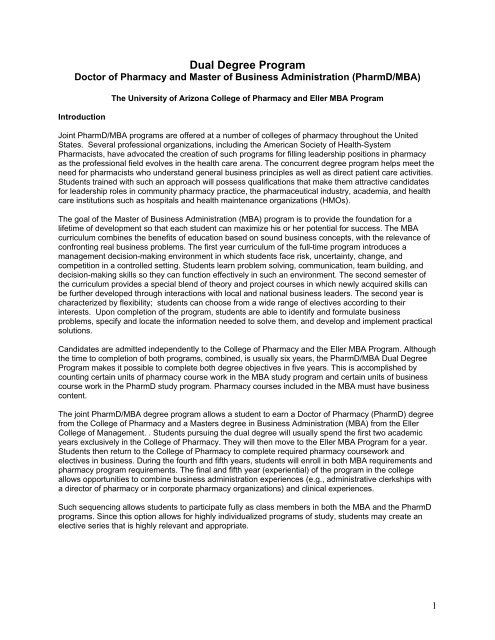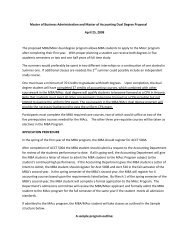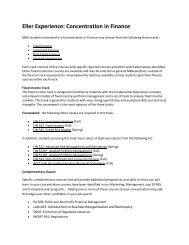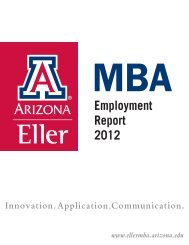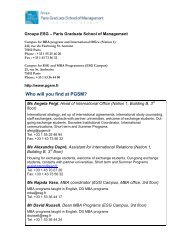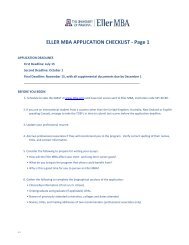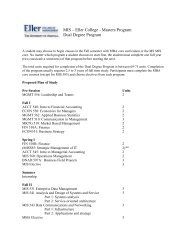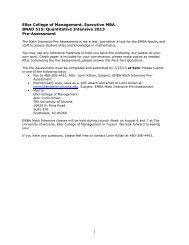Dual Degree Program - Eller MBA Programs - University of Arizona
Dual Degree Program - Eller MBA Programs - University of Arizona
Dual Degree Program - Eller MBA Programs - University of Arizona
You also want an ePaper? Increase the reach of your titles
YUMPU automatically turns print PDFs into web optimized ePapers that Google loves.
<strong>Dual</strong> <strong>Degree</strong> <strong>Program</strong><br />
Doctor <strong>of</strong> Pharmacy and Master <strong>of</strong> Business Administration (PharmD/<strong>MBA</strong>)<br />
Introduction<br />
The <strong>University</strong> <strong>of</strong> <strong>Arizona</strong> College <strong>of</strong> Pharmacy and <strong>Eller</strong> <strong>MBA</strong> <strong>Program</strong><br />
Joint PharmD/<strong>MBA</strong> programs are <strong>of</strong>fered at a number <strong>of</strong> colleges <strong>of</strong> pharmacy throughout the United<br />
States. Several pr<strong>of</strong>essional organizations, including the American Society <strong>of</strong> Health-System<br />
Pharmacists, have advocated the creation <strong>of</strong> such programs for filling leadership positions in pharmacy<br />
as the pr<strong>of</strong>essional field evolves in the health care arena. The concurrent degree program helps meet the<br />
need for pharmacists who understand general business principles as well as direct patient care activities.<br />
Students trained with such an approach will possess qualifications that make them attractive candidates<br />
for leadership roles in community pharmacy practice, the pharmaceutical industry, academia, and health<br />
care institutions such as hospitals and health maintenance organizations (HMOs).<br />
The goal <strong>of</strong> the Master <strong>of</strong> Business Administration (<strong>MBA</strong>) program is to provide the foundation for a<br />
lifetime <strong>of</strong> development so that each student can maximize his or her potential for success. The <strong>MBA</strong><br />
curriculum combines the benefits <strong>of</strong> education based on sound business concepts, with the relevance <strong>of</strong><br />
confronting real business problems. The first year curriculum <strong>of</strong> the full-time program introduces a<br />
management decision-making environment in which students face risk, uncertainty, change, and<br />
competition in a controlled setting. Students learn problem solving, communication, team building, and<br />
decision-making skills so they can function effectively in such an environment. The second semester <strong>of</strong><br />
the curriculum provides a special blend <strong>of</strong> theory and project courses in which newly acquired skills can<br />
be further developed through interactions with local and national business leaders. The second year is<br />
characterized by flexibility; students can choose from a wide range <strong>of</strong> electives according to their<br />
interests. Upon completion <strong>of</strong> the program, students are able to identify and formulate business<br />
problems, specify and locate the information needed to solve them, and develop and implement practical<br />
solutions.<br />
Candidates are admitted independently to the College <strong>of</strong> Pharmacy and the <strong>Eller</strong> <strong>MBA</strong> <strong>Program</strong>. Although<br />
the time to completion <strong>of</strong> both programs, combined, is usually six years, the PharmD/<strong>MBA</strong> <strong>Dual</strong> <strong>Degree</strong><br />
<strong>Program</strong> makes it possible to complete both degree objectives in five years. This is accomplished by<br />
counting certain units <strong>of</strong> pharmacy course work in the <strong>MBA</strong> study program and certain units <strong>of</strong> business<br />
course work in the PharmD study program. Pharmacy courses included in the <strong>MBA</strong> must have business<br />
content.<br />
The joint PharmD/<strong>MBA</strong> degree program allows a student to earn a Doctor <strong>of</strong> Pharmacy (PharmD) degree<br />
from the College <strong>of</strong> Pharmacy and a Masters degree in Business Administration (<strong>MBA</strong>) from the <strong>Eller</strong><br />
College <strong>of</strong> Management. . Students pursuing the dual degree will usually spend the first two academic<br />
years exclusively in the College <strong>of</strong> Pharmacy. They will then move to the <strong>Eller</strong> <strong>MBA</strong> <strong>Program</strong> for a year.<br />
Students then return to the College <strong>of</strong> Pharmacy to complete required pharmacy coursework and<br />
electives in business. During the fourth and fifth years, students will enroll in both <strong>MBA</strong> requirements and<br />
pharmacy program requirements. The final and fifth year (experiential) <strong>of</strong> the program in the college<br />
allows opportunities to combine business administration experiences (e.g., administrative clerkships with<br />
a director <strong>of</strong> pharmacy or in corporate pharmacy organizations) and clinical experiences.<br />
Such sequencing allows students to participate fully as class members in both the <strong>MBA</strong> and the PharmD<br />
programs. Since this option allows for highly individualized programs <strong>of</strong> study, students may create an<br />
elective series that is highly relevant and appropriate.<br />
1
The <strong>Eller</strong> <strong>MBA</strong> <strong>Program</strong><br />
The recognized value <strong>of</strong> an <strong>Eller</strong> School <strong>MBA</strong> means that admission to the program is highly competitive.<br />
They receive over 10,000 requests per year from all over the world for information. Applicants generally<br />
present impressive credentials, and individual candidates are competing for a limited number <strong>of</strong> places in<br />
the entering class.<br />
The <strong>MBA</strong> Admissions Committee considers every aspect <strong>of</strong> an applicant's background when reviewing an<br />
application. In particular, they examine the applicant's ability to perform in our rigorous academic<br />
environment as evidenced by prior accomplishments as an undergraduate, by scores on the GMAT, and<br />
by recommendations from former pr<strong>of</strong>essors. They examine the applicant's prospects for leadership by<br />
reviewing work experience, extracurricular activities, recommendation letters, and the application essays.<br />
Importantly, the Committee looks at the "big picture"--including trade-<strong>of</strong>fs for differing levels <strong>of</strong> strengths<br />
across each <strong>of</strong> these categories.<br />
When this review is completed, the <strong>Eller</strong> <strong>MBA</strong> <strong>Program</strong> still has many more desirable applicants than<br />
openings in the entering class. From among these, the Committee must then determine those who<br />
represent the best fit with the program's <strong>of</strong>ferings and who stand the best chances for success in their<br />
environment.<br />
Because <strong>of</strong> the quantitative skills required for courses in the <strong>Eller</strong> <strong>MBA</strong> program, the prerequisite<br />
mathematics courses should be completed prior to enrollment and are a consideration in the admissions<br />
process. Candidates should provide evidence <strong>of</strong> the completion <strong>of</strong> college algebra and calculus, or<br />
enrollment in these courses with the admission application material. In addition, candidates are expected<br />
to have a reasonable level <strong>of</strong> comfort with personal computers, and with word processing (e.g. Micros<strong>of</strong>t<br />
Word) and spreadsheet (e.g. Micros<strong>of</strong>t Excel) s<strong>of</strong>tware packages prior to enrollment.<br />
Applying to the <strong>MBA</strong> <strong>Program</strong><br />
Students must already be matriculating in the Doctor <strong>of</strong> Pharmacy program to apply for the joint degree<br />
program. During the second year <strong>of</strong> the PharmD program students may apply for admission to the<br />
<strong>University</strong> <strong>of</strong> <strong>Arizona</strong> Graduate College and to the <strong>Eller</strong> <strong>MBA</strong> <strong>Program</strong> for the <strong>Dual</strong> <strong>Degree</strong> <strong>Program</strong>. The<br />
GMAT (Graduate Management Admissions Test) is required for admission to the <strong>Eller</strong> <strong>MBA</strong> program, as<br />
is a formal interview.<br />
2004-2005 Application Timetable<br />
Application received by<br />
Decision sent by<br />
November 15 December 15<br />
February 15 March 15<br />
April 15 May 15<br />
Tuition Academic Year 2004-2005<br />
<strong>Arizona</strong> Residents:<br />
Non-Resident/International:<br />
$13,847/year<br />
$22,827/year<br />
Doctor <strong>of</strong> Pharmacy (PharmD) Requirements<br />
Eight units <strong>of</strong> upper division electives (non-practicum) and 15 units <strong>of</strong> practicum electives are required for<br />
the PharmD program. The total number <strong>of</strong> required units (excluding the minimum <strong>of</strong> 67 required for entry<br />
into the program) is 142. Students pursuing the concurrent PharmD and <strong>MBA</strong> degree program are<br />
expected to fulfill these basic PharmD requirements incorporating the modifications outlined below. All<br />
electives will be taken from <strong>MBA</strong> elective options and the Pharmacy Practice Project (PhPr 896a) will be<br />
accomplished by taking MAP 573.<br />
2
Master <strong>of</strong> Business Administration (<strong>MBA</strong>) Requirements<br />
The <strong>MBA</strong> program comprises 32 units in the first year and a minimum <strong>of</strong> 28 in the second year. The first<br />
year is made up <strong>of</strong> required courses that must be taken completely and in order, plus two business<br />
electives. Thus, the PharmD student is required to take a year <strong>of</strong>f from the Pharmacy program to<br />
complete this work.<br />
The 28 unit second year is made up <strong>of</strong> 25 units <strong>of</strong> electives and one 3-unit capstone course (MAP 573).<br />
The following are proposed to meet the elective requirements (note, Pharmacy courses that serve as<br />
<strong>MBA</strong> electives must be taken at the 500 or higher level).<br />
Combined Credit – Units Credited to Both <strong>Degree</strong>s<br />
• PhPr 442/542 - Pr<strong>of</strong>essional Practice Management - 3 units <strong>of</strong> <strong>MBA</strong> elective credit<br />
• Clerkship – Two Administrative (PhPr 815k) clerkships = 10 units <strong>of</strong> <strong>MBA</strong> elective credit<br />
• <strong>MBA</strong> program electives – 12 units (3 in 2 nd semester <strong>of</strong> 2 nd pharmacy year, 3 in the 1 st semester <strong>of</strong> the<br />
3 rd pharmacy year, and 6 in 2 nd semester <strong>of</strong> 3 rd pharmacy year). The electives for the 2 nd semester <strong>of</strong><br />
the 2 nd pharmacy are restricted to a certain group (See Appendix B).<br />
• Total = 25 units <strong>of</strong> elective<br />
• MAP 573 (serves as senior project requirement – PhPr 896a – for pharmacy degree) – 3 units (note<br />
PhPr 896a is a 2-unit course). Credit taken in 2 nd semester <strong>of</strong> final pharmacy year.<br />
• Total = 28 units to satisfy second year requirements <strong>of</strong> <strong>MBA</strong> program.<br />
A summary <strong>of</strong> the structure <strong>of</strong> the combined program is provided in Appendix A.<br />
Students may also take select <strong>MBA</strong> electives in the summer prior to the first <strong>MBA</strong> year and any elective in<br />
any summer after the first <strong>MBA</strong> year prior to graduation to reduce course load at other times. Some<br />
courses are available as part <strong>of</strong> Evening <strong>MBA</strong> programs.<br />
3
First Pr<strong>of</strong>essional Year<br />
First Semester<br />
Appendix A<br />
Proposed Doctor <strong>of</strong> Pharmacy/<strong>MBA</strong> Curriculum<br />
Second Semester<br />
Course Units Course Units<br />
Bioc 460, Biochemistry 3 CBA 807, Anatomy 3<br />
Bioc 461, Biochemistry<br />
2<br />
Psio 480, Physiology 5<br />
Pcol 820, Case Discussions<br />
PhPr 805a, Beginning Pharmacy<br />
Practice<br />
1<br />
1 PhPr 805b Pharmacy Practice 1<br />
PhPr 802, Pharmaceutics 3 Pcol 821, Case Discussions 1<br />
Pcol 835, Immunology and<br />
Hematology<br />
2 PhPr 816, Patient Assessment 2<br />
PhPr 806a, Pharmaceutics Lab 1 PhPr 861a, Drug Literature<br />
Evaluation – Statistical Methods<br />
PhPr 800, Calculations 1<br />
PhPr 804, Interviewing and<br />
Counseling Skills<br />
2 PhPr 606b, Pharmaceutics Lab 1<br />
Total 16 Total 15<br />
2<br />
Second Pr<strong>of</strong>essional Year<br />
First Semester<br />
Second Semester<br />
Course Units Course Units<br />
PhPr 861b, Research Design 2 PhPr 861c, Drug Literature<br />
Evaluation - Applications<br />
Pcol 837a, Medicinal Chemistry 3 Pcol 837b, Medicinal Chemistry 2<br />
Pcol 871a, Pharmacology 4 Pcol 71c, Pharmacology 3<br />
PhPr 845, Medication Use in Health 3 Pcol 874, Clinical Toxicology 2<br />
Care Systems<br />
Pcol 836a, Chemotherapy <strong>of</strong><br />
Infectious Diseases<br />
3 PhPr 875a, Pharmacotherapeutics<br />
PhPr 812, Non-Prescription<br />
Medication and Devices<br />
PhPr 822, Case Discussions 1 Electives (Business) 3*<br />
Total 16 Total 20<br />
* Business electives may be taken at this point<br />
by approved students. Since core courses will<br />
not have been taken yet, only select individuals<br />
with considerable background may take a<br />
business elective at this point. All others will<br />
have to take 3 units <strong>of</strong> electives during the<br />
summer or as an evening course after <strong>MBA</strong> year<br />
2<br />
6<br />
2<br />
4
<strong>MBA</strong> <strong>Program</strong> First Year<br />
Fall<br />
Spring<br />
Department No. Units Department No. Units<br />
Intro to Financial Acct ACCT 540 2 Intro to Managerial Acct. Acct 545 2<br />
Applied Business Stats MAP 562 2 Operations Management MIS 560 2<br />
Economics for Managers ECON 550 2 Stratg Mngmnt <strong>of</strong> InfoSys MIS 585 2<br />
Leadership in Teams MAP 556 2 Business Strategy Econ 551 2<br />
Finance FIN 510 2 Business Field Projects BAD 597a 3<br />
Market-Based Mgmt MKTG 510 2 Elective 3<br />
Communication and Elective 3<br />
Pr<strong>of</strong>essional Developmt MAP 509A 2<br />
Pr<strong>of</strong>essional Developmt MAP 509B 1<br />
Subtotals 15 17<br />
** Students must undertake an exit advising session at the completion <strong>of</strong> the first <strong>MBA</strong> year to design<br />
their remaining curriculum. This will help insure that graduation on time is possible.<br />
Summer Second Pr<strong>of</strong>essional Year (Optional)<br />
Course<br />
PhPr 803a/b, Community and Institutional Pharmacy Practice Clerkship (six weeks each and<br />
5 units each – may also be done during the 4 th pr<strong>of</strong>essional year)*<br />
Units<br />
5-10<br />
Third Pr<strong>of</strong>essional Year<br />
First Semester<br />
Second Semester<br />
Course Units Course Units<br />
PhPr 807, Pharmacokinetics 4 PhPr 885, Clinical Pharmacokinetics 3<br />
PhPr 808a, Pharmacokinetics<br />
Discussion<br />
1 PhPr 808b, Pharmacokinetics<br />
Discussion<br />
PhPr 875b, Pharmacotherapeutics 6 PhPr 875c, Pharmacotherapeutics 6<br />
PhPr 842, Pr<strong>of</strong>essional Practice 3<br />
PhPr 843, Pharmacy Laws/Ethics 2<br />
Management*<br />
PhPr 895b, Preparation for rotations 1<br />
Elective (Business)* 3 Electives (Business)* 6<br />
1<br />
Total<br />
18 (vs<br />
17)<br />
Total<br />
18 (vs<br />
16)<br />
* It may be desirable to make one <strong>of</strong> the business electives a “concentration” elective<br />
5
Summer Session<br />
First Semester<br />
Second Semester<br />
Course Units Course Units<br />
Pharmacy Clinical Clerkships:<br />
(PhPr 803a-e, PhPr 810a-i, or PhPr<br />
815a-l)<br />
5 Pharmacy Clinical Clerkships:<br />
(PhPr 803a-e, PhPr 810a-i, or<br />
PhPr 815a-l)<br />
<strong>MBA</strong> elective: 3 units (if not taken in second semester <strong>of</strong> second pr<strong>of</strong>essional year)<br />
Fourth Pr<strong>of</strong>essional Year<br />
First Semester<br />
Second Semester<br />
Course Units Course Units<br />
Required/Elective Clerkships:<br />
PhPr 803a-e, PhPr 810a-i,<br />
or PhPr 815a-l **<br />
10-15 Required/Elective Clerkships:<br />
PhPr 803a-e, PhPr 810a-i,<br />
or PhPr 815a-l **<br />
5<br />
10-15<br />
(=5 <strong>MBA</strong> units)<br />
(=5 <strong>MBA</strong> units)<br />
MAP 573 Capstone Course<br />
(serves as PhPr 896a, Pharmacy<br />
Practice Project)*<br />
3<br />
Total 15 Total 18<br />
* Indicates “crossover” courses that apply to both programs. Pharm.D./<strong>MBA</strong> students must make a formal<br />
presentation <strong>of</strong> the capstone project as a poster during the regularly scheduled senior project poster<br />
presentation session.<br />
** Two administrative clerkships (PhPr 815k) must be taken during the fourth pr<strong>of</strong>essional year as<br />
crossover course electives.<br />
• PhPr 803 a/b (each lasting six weeks) may be done in the summer after the first <strong>MBA</strong> year or during<br />
the fourth pr<strong>of</strong>essional year. If done in the summer after the <strong>MBA</strong> year, the student will have between<br />
6 and 12 weeks <strong>of</strong>f during the summer <strong>of</strong> the fourth pr<strong>of</strong>essional year.<br />
Eight units <strong>of</strong> upper division electives (non-practicum) and 25 units <strong>of</strong> practicum electives are required for<br />
the Pharm.D. program. Total units (prepharmacy and pr<strong>of</strong>essional): 67 + 142 = 209 units.<br />
6
Appendix B – Courses That May be Taken in the Second Semester, Second<br />
Year <strong>of</strong> PharmD <strong>Program</strong> for Graduate Credit<br />
MANAGEMENT AND POLICY<br />
MAP 530-1 U<br />
MAP 531-1<br />
MAP 545-1<br />
MAP 564-1<br />
Human Resource Policies<br />
Human Resource & Services<br />
Interactive Behavior Small Group<br />
Negotiation<br />
MANAGEMENT INFORMATION SYSTEMS<br />
MIS 507A-1<br />
MIS 507B-1<br />
MIS 511-1<br />
MIS 511-2<br />
MIS 531B-1<br />
MIS 531B-2<br />
MIS 578-1 U<br />
Info Sys Architecture<br />
Data Communication<br />
Social Issues <strong>of</strong> Computing<br />
Social Issues <strong>of</strong> Computing<br />
Data Structures & Database Mgmt<br />
Data Structures & Database Mgmt<br />
Project Management<br />
PUBLIC ADMINISTRATION<br />
PA 523-1<br />
PA 525-1<br />
Health and Public Policy<br />
Current Topics Health Services and Management<br />
PHARMACEUTICAL SCIENCES GRADUATE COURSES (ADMINISTRATION/BUSINESS)<br />
PhSc 612<br />
Patient-Reported Health Outcomes<br />
PharmD<strong>MBA</strong><br />
7


